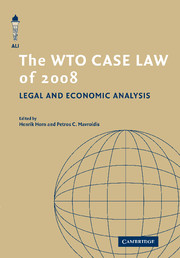Book contents
- Frontmatter
- Contents
- Foreword
- Introduction
- Appellate Body Report in EC–Bananas III: waiver-thin, or lock, stock, and metric ton?
- Guilt by association: US – Measures Relating to Shrimp from Thailand and US – Customs Bond Directive for Merchandise Subject to Anti-Dumping/Countervailing Duties
- Mexico–Olive Oil: Remedy without a cause?
- US–Stainless Steel (Mexico)
- Continued Suspense: EC–Hormones and WTO Disciplines on Discrimination and Domestic Regulation
- United States – Subsidies on Upland Cotton Recourse to Article 21.5 by Brazil
- China – Measures Affecting Imports of Automobile Parts
- India – Additional and Extra-Additional Duties on Imports from the United States
- Comment: India – Additional and Extra-Additional Duties on Imports from the United States
Mexico–Olive Oil: Remedy without a cause?
Published online by Cambridge University Press: 07 September 2011
- Frontmatter
- Contents
- Foreword
- Introduction
- Appellate Body Report in EC–Bananas III: waiver-thin, or lock, stock, and metric ton?
- Guilt by association: US – Measures Relating to Shrimp from Thailand and US – Customs Bond Directive for Merchandise Subject to Anti-Dumping/Countervailing Duties
- Mexico–Olive Oil: Remedy without a cause?
- US–Stainless Steel (Mexico)
- Continued Suspense: EC–Hormones and WTO Disciplines on Discrimination and Domestic Regulation
- United States – Subsidies on Upland Cotton Recourse to Article 21.5 by Brazil
- China – Measures Affecting Imports of Automobile Parts
- India – Additional and Extra-Additional Duties on Imports from the United States
- Comment: India – Additional and Extra-Additional Duties on Imports from the United States
Summary
Abstract: This paper provides a legal-economic analysis of the unappealed WTO Panel Report in Mexico–Olive Oil. The case involved a countervailing-duty measure imposed by Mexico on imports of olive oil from the European Communities (in particular, Spain and Italy). The dispute raised important issues regarding the determination of causation of injury, as neither the Panel nor the investigating authority gave much credence to evidence that the main complaint of the domestic industry was the loss of a distribution agreement and brand-name rights with a Spanish exporter. The dispute also raised interesting concerns regarding the remedies for violations of procedural obligations in the conduct of anti-dumping/ countervailing-duty investigations and the right of a domestic producer that has ceased production to seek protection under the trade-remedy laws.
Introduction
Approximately half of the jurisprudence of the WTO dispute-settlement system consists of disputes arising out of trade-remedy or contingent-protection measures imposed by WTO Members. Given this fact, it might be expected that the jurisprudence on the WTO Anti-Dumping and Subsidy and Countervailing Measure (SCM) Agreements would be relatively settled. Not so. Each new WTO dispute under these agreements, including the recent unappealed WTO Panel Report in Mexico–Olive Oil, throws up both new issues that have yet to be resolved and recurring issues where the jurisprudence continues to evolve.
While the Mexico–Olive Oil dispute was neither particularly complicated nor very controversial, the decision raised several issues that gave rise to new interpretations of the relevant agreements or that illustrated some of the recurring problems in challenging anti-dumping or countervailing-duty measures in WTO dispute-settlement proceedings.
- Type
- Chapter
- Information
- The WTO Case Law of 2008 , pp. 85 - 116Publisher: Cambridge University PressPrint publication year: 2010



